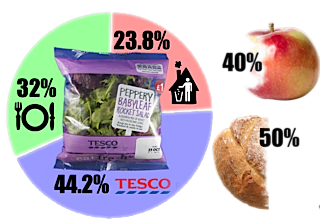
Less than one third of Tesco bagged salads reach a plate
The UK supermarket this week revealed wastage rates for some of its products […]

The UK supermarket this week revealed wastage rates for some of its products […]
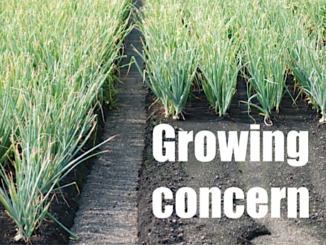
UK National Farmers’ Union warned of ‘long term damage’ to its membership when the Seasonal Agricultural Workers’ Scheme is shut down […]
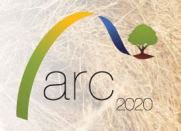
Dear friends and supporters, Hello from Oliver and Shirin, the new ARC2020 communications team! Although sad to say goodbye, all of us at ARC2020 are happy to wish Kate the best on this next, exciting step in her career. She has stepped over to work with Slow Food in Italy, so is remaining in an important area of food and farming politics. This communications role will now be split between the two of us : Oliver, as EU Correspondent, and Shirin as Communication Manager. We look forward to working closely with many of you! And so to the main news. Despite the substantive CAP agreement during the Irish presidency, there is still much to fight for in the remaining negotiations. September will see Trilogues on CAP budget issues including flexibility between pillars, while late September or October will likely see the Council and Parliament finalising texts and translations. What’s clear already, however, is that many CAP decisions have been left to national and regional authorities. This means that we can all direct much energy and focus […]

TTIP talks postponed, but is this just another opportunity for the corporate sector to lobby for longer? […]
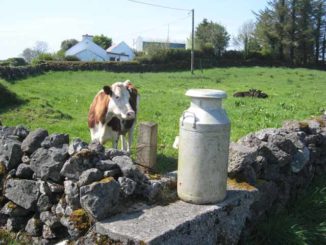
With milk quota due to end in 2015, how is Europe preparing? […]
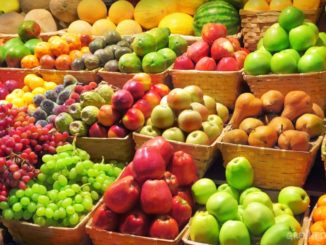
Toxic pesticides residues in fruits and veggies in Greece: news of the systemic, the banned and even the illegal.
[…]
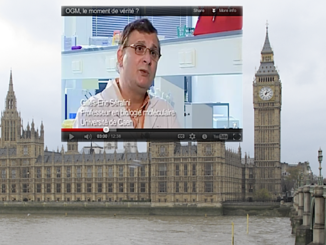
The biotech industry has not had everything its way in the wake of the bitter personal attacks on the CRIIGEN scientists […]
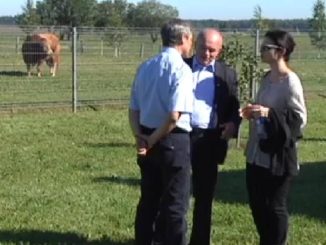
Farm ministers met informally in Lithuania and agreed on all sorts of things, even if the adopted policies run counter to these observations […]

State of play: Decisions taken by Member States for the implementation of the new direct support system In December 2014, Member States had to notify how they will grant the greening payment and whether they will designate additional sensitive areas where permanent grassland should not be converted. By 31 January 2015, Member States will need to notify their decisions regarding the definitions of permanent grassland and agricultural activity, the payment for young farmers, and the use of the national/regional reserves for granting entitlements. Find the information note published by the European Commission here: 2000m² : a conversation about your share of global food and land 2000m² is an outreach tool called based on the idea that if we were to divide the global surface of arable land (1,4 billion hectares) by the number of people on the planet (7 billion), we would each get about 2000m². The aim is to encourage people to think about questions like: What can be grown on a field of that size? What is being grown right now? Through the decisions […]
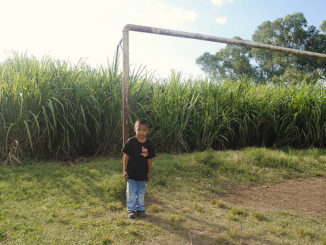
The European Parliament (EP) voted Wednesday to include what is called Indirect Land Use Change (ILUC) considerations in its biofuels targets. What effect will this have on the EU’s renewable energy, climate change and also on land use? This European Parliament vote means that the real climate impact, due to displacement of food production, will be taken into account in the EU’s biofuel targets and policies. A cap of 6% on land-based biofuels, including energy crops, has been adopted. According to Terhi Lehtonen environment advisor Greens/EFA group: “This would be the minimum necessary to take real measures to tackle the climate, food security and other social impacts due to displacement of food production that is caused by EU biofuels policy.” Lehtonen adds: “The EP vote also signalled to the markets that future investments should be on biofuels with low-ILUC risk and no food based fuels should be supported after 2020.” How did the vote go? See votewatch here Background Biofuels are liquid fuels made mostly from crops which can be mixed with fossil fuels to […]

The federal elections in Germany are on September 22nd. Below, an overview of they key points relating to agriculture from each party’s platform […]

Raw campaigner Jonty’s own account of the camp, workshops and demonstration in Wietze […]
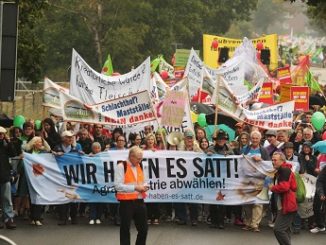
7000 people callled for fair farming, surrounding Europe’s biggest chicken slaughterhause, which plans to slaughter 400,000 chickens daily […]
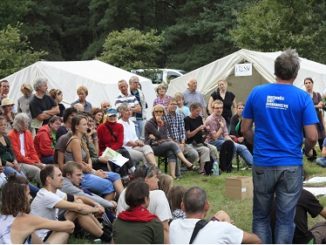
Excitement building at the camp before today’s protest outside Europe’s largest slaughterhause […]
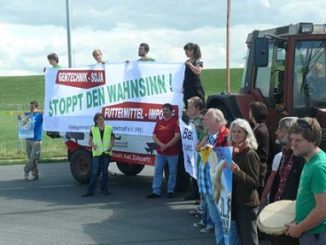
Farmers, students and enviromental activists block main supplier of intensive farming systems in Germany […]
Agricultural and Rural Convention